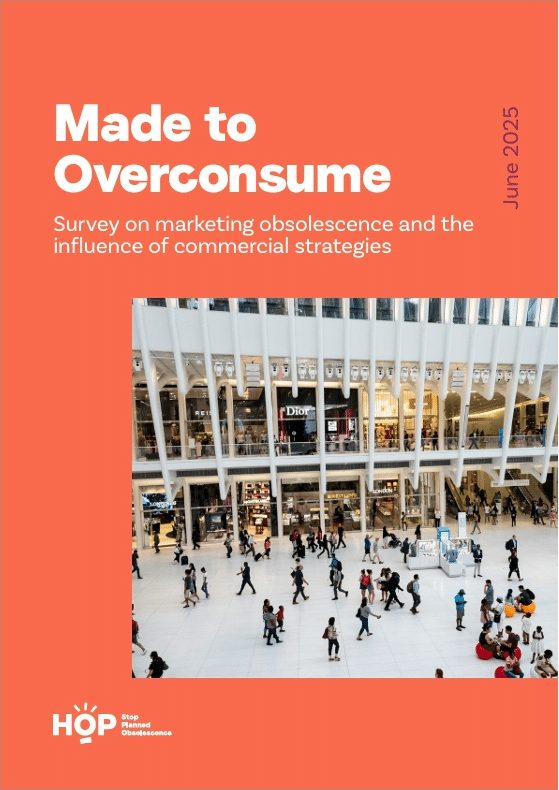We live in a «society of envy, orchestrated by marketing», as one participant in the citizens’ agora organised by HOP in March 2025 pointed out. Marketing can serve to promote sustainability and the ecological transition. However, the sector also has its pitfalls, particularly in encouraging over-consumption. Although 90% of French people claim to be at least aware of responsible consumption, they are constantly being encouraged to buy.
Even a product that works is not immune to being replaced by its user: 39% of vacuum cleaners, 48% of television sets and 64% of smartphones are replaced when they are still working.
When the incentive to renew is particularly aggressive, unfair or manipulative, it should be considered a marketing obsolescence offence. However, marketing that encourages over-consumption is also based on an accumulation of very deep-rooted, interwoven practices that cannot be considered criminal, but still deserve to be identified in a systemic way and regulated, given their impact on consumers and the environment.
HOP is therefore proposing an inventory of these practices. Discourses promoting novelty are reinforced by the omnipresence of advertising: consumers are exposed to more than 15,000 commercial stimuli daily3, and 66% of French people say they feel overexposed to advertising4. Right from the product design stage, the renewal of product ranges and generations creates an artificial novelty that makes old products obsolete. Price is also a major incentive, with monetised trade-ins and sometimes misleading promotional offers, for example. Finally, retailers exploit perception bias and use «dark patterns», misleading interfaces to manipulate consumers.
The control of these practices remains inadequate. Self regulation of advertising does not really limit incentives to over-consume, and the renewal of ranges is not regulated by law. While prices are subject to certain rules, these do not directly concern over-consumption. Dark patterns are theoretically prohibited, but the legal framework is still too vague to be effective.
Faced with the predominance of marketing that encourages over-consumption, HOP is calling on the entire sector to take up the issue of product sustainability and is asking the French Government to launch a roadmap on the subject. It is vital that good marketing practices promoting the circular economy become widespread, and marginalise incentives for renewal. A framework seems necessary to give impetus to the transformation and not let consumers shoulder the responsibility for over-consumption. Drawing on discussions with a number of experts and at the citizens’ agora organised by HOP in March 2025, the association has drawn up a list of proposals to combat marketing that encourages over-consumption.
Among these 30 recommendations, HOP proposes:
- the legal recognition of the offence of marketing obsolescence;
- the improved regulation of advertising, with the power to impose penalties, and the introduction of a Roadmap for sustainable marketing and responsible consumption;
- the allocation of advertising displays in public areas solely for cultural communications or communications of general interest.




